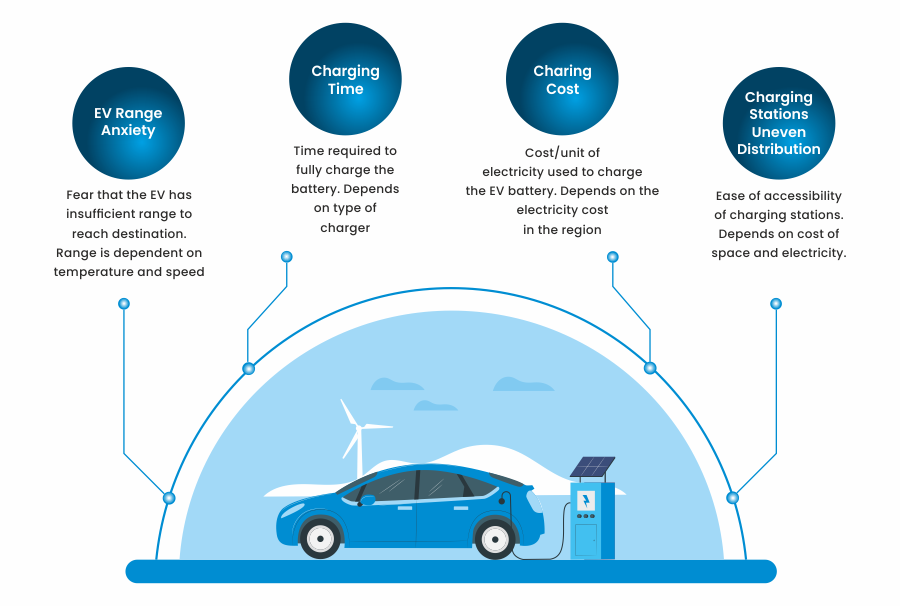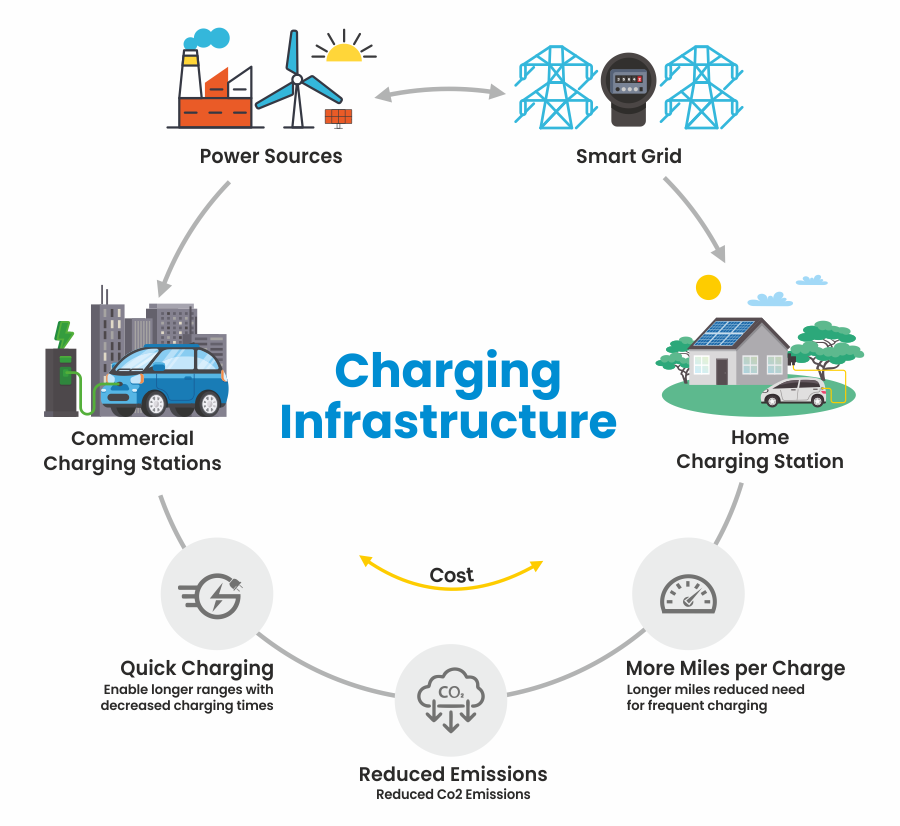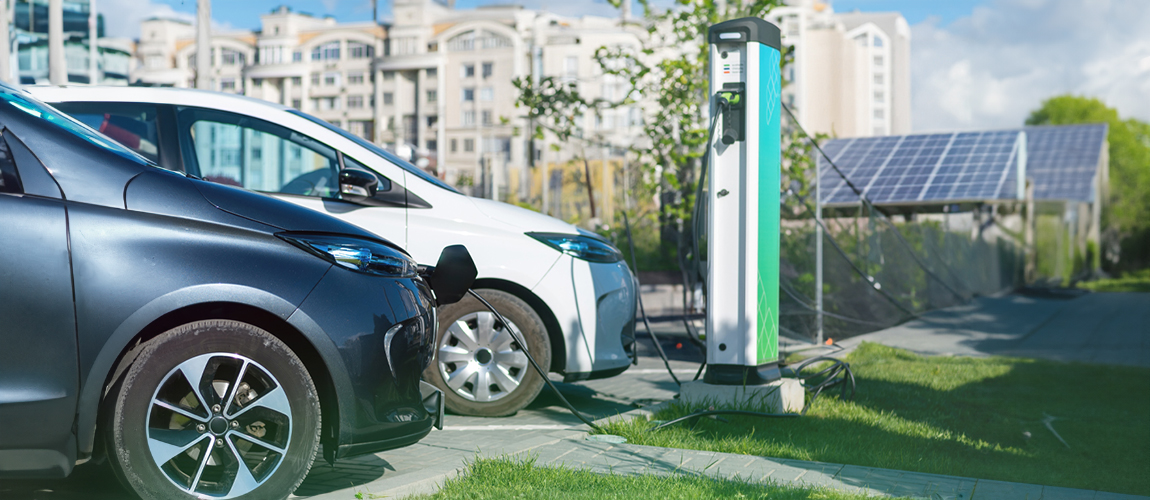In the journey towards a sustainable future, two technologies have emerged as transformative forces; solar cells and electric vehicles (EVs). These innovations not only promise to diminish our reliance on fossil fuels but can also collaboratively reframe our energy consumption landscape. The convergence of solar power and electric vehicles stands out as a powerful synergy.
Revolutionizing Transportation with Electric Power
Electric Vehicles (EVs) have transitioned from being a novelty to a mainstream choice. EV sales are on the rise globally. All data singularly points to the fact that the future of electric mobility looks promising, which is primarily fueled by benefits such as high efficiency and low operating costs.
Despite the quick adoption of Electric Vehicles, IC-engined vehicles, which have historically been the primary means of propulsion for cars, are still the most preferred means of motorized mobility. Though Electric Vehicle offers a compelling alternative, several impediments like long battery charging times and limited vehicle (battery) range are slowing the widespread adoption of Electric Vehicles. It has to be understood that both these shortcomings are strongly dependent on the span and reliability of the charging infrastructure. Thus, the positioning of Electric Vehicles as a replacement for IC-engines depends heavily on the establishment of a robust charging infrastructure.
As of 2023, nearly 1.2 billion passenger vehicles on the road currently run on IC engines. So the potential for Electric Vehicles is immense considering the governments resolve to achieve carbon neutrality in transportation.
The Role of Charging Infrastructure in Propelling the EV Ecosystem
As the number of Electric Vehicles increases on the road, the need for charging stations will increase manifold. It will become important for the existing charging infrastructure to undergo a rapid expansion, ensuring that its capacity effectively eliminates the charging barriers for Electric Vehicle owners.
The charging infrastructure will need to scale up, considering the following factors:

- To Overcome Range Anxiety
The charging infrastructure in the country is at a nascent stage. Many potential Electric Vehicle buyers are shying away from making the purchase decision owing to what is known as “ Range Anxiety”. The fear of running out of battery power before reaching the next charging point is real. This hinders the early adoption of Electric Vehicle, especially cars, which an average buyer might also want to use for out-of-station travel in addition to daily commute.
- To Overcome Range Anxiety
The charging infrastructure in the country is at a nascent stage. Many potential Electric Vehicle buyers are shying away from making the purchase decision owing to what is known as “ Range Anxiety”. The fear of running out of battery power before reaching the next charging point is real. This hinders the early adoption of Electric Vehicle, especially cars, which an average buyer might also want to use for out-of-station travel in addition to daily commute.
- Facilitate Long-distance Travel
The versatility of electric vehicles becomes truly apparent when owners can seamlessly embark on long-distance journeys. This will require charging infrastructure strategically positioned along major roadways, petrol stations and hotels rendering electric mobility a viable option for cross-country travel.
- Urban and Suburban Integration
Charging infrastructure is not confined to highways; it extends to the heart of our cities and suburbs. Residential charging stations, workplace charging stations, and public charging points should allow Electric Vehicle owners to seamlessly integrate charging into their daily routines. Easy accessibility of charging points can make electric vehicles a practical and convenient choice for daily commute.
- Facilitate Variety of Charging Options
Charging infrastructure should be able to cater to varied user needs by offering a range of charging options, from fast chargers for high-traffic locations to slow chargers at locations that allow the liberty of time. This flexibility not only accommodates different lifestyles but also ensures that electric mobility is adaptable to varying driving patterns.
Eco-Charging: A Sustainable Approach to Energizing EV Chargers
Solar energy is poised to play a pivotal role in bolstering the Electric Vehicle charging infrastructure, primarily because solar-powered charging stations present a renewable and sustainable power source. The ease with which solar-powered charging stations can be set-up at off-grid locations can help eliminate the strain on the electric grid, particularly during peak demand periods.

Solar power based Electric Vehicle charging reduces expenses. This underlines the viability and attractiveness of solar energy as a sustainable and cost-efficient solution for powering electric vehicles.
Solar-powered Electric Vehicle charging infrastructure can revolutionize transportation by reducing reliance on traditional fuels. Government-backed initiatives and legislative actions are underway to fortify the expansion of Electric Vehicle charging, emphasizing the development of infrastructure. This aligns well with the forecasts of increased Electric Vehicle production, propelled by growth in sales.
Greater the use of renewable power at charging points lesser will be the reliance on the grid. Grid-independent charging points can be developed that can be used to charge storage batteries locally, allowing a battery swapping mechanism through battery banks. This is seriously being considered by Electric Vehicle manufacturers in a bid to reduce the turnaround time for charging.
A Wrap-Up
As the Electric Vehicle revolution gains momentum, the call for a resilient and sustainable charging infrastructure intensifies concurrently. In addressing this demand, solar energy emerges as a pragmatic and effective solution, leveraging its numerous advantages to meet the evolving needs of the electric vehicle landscape.
For individuals presently using Electric Vehicles or contemplating the transition, incorporating a solar panel system into their residence can prove transformative. This can bring forth a multitude of advantages, encompassing energy independence, financial savings, and a diminished carbon footprint.
About LUBI Electronics
LUBI Electronics is a leading company in India, exhibiting expertise in the automation, solar, and control panel industry.
Our solar offerings include best-in-class solar modules, solar pumps, solar pump controllers and solar inverters.
For more information on our offerings, please reach out to us at lubi@lubielectronics.com.












